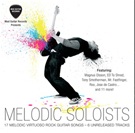How To Use Musical Emotion To Improve Your Guitar Playing
 One big challenge for developing your musical creativity is learning how to integrate musical ideas with thoughts and emotions. The ability to do this is what distinguishes great musicians from average musicians. Once you can express emotions in music, you will be on your way to becoming a more complete guitar player. In addition, learning the ins and outs of musical expression will help you to enhance the experience for anyone who listens to your music.
One big challenge for developing your musical creativity is learning how to integrate musical ideas with thoughts and emotions. The ability to do this is what distinguishes great musicians from average musicians. Once you can express emotions in music, you will be on your way to becoming a more complete guitar player. In addition, learning the ins and outs of musical expression will help you to enhance the experience for anyone who listens to your music.
Most guitarists want to be able to express themselves better with their guitar playing; however, the majority of guitar players have no idea how to actually practice this skill. This leads to a lot of time being wasted on practicing guitar in a way that does not produce big results. The solution to this problem is to develop a more accurate fundamental understanding of how to develop musical creativity.
Many people play guitar songs and melodies from great guitar players hoping that they will soak in the same musical expression abilities through time and experience. Although it is cool to play nice guitar riffs, and learn your favorite solos on guitar, doing this alone will not give you musical creativity. The reality is that copying other musicians will bring very few results on its own. There are essentially two things you need to understand in order to become highly creative and express emotions in music:
- You must know exactly how the musicians you listen to manage to make you feel certain emotions while you listen to their music. This means learning why the musicians you listen to make the specific musical choices they do. Unlike copying their ideas, this will give you a foundation for truly developing your own musical creativity. Additionally, it is important to understand how musicians think when making music so that you can learn to shape your musical ideas into your own unique and expressive musical style. This means that when you make your own music, you will be able to express the same emotions as your favorite musicians but do so WITHOUT “copying” someone else’s ideas note for note. Once you know exactly how music is used to create emotions in a listener, you have the power to turn your music into a clear communication of your ideas and feelings.
- You must know how specific musical emotions can be created and expressed by making certain musical choices while composing music or playing a guitar solo. Additionally, you need to be able to make your audience understand exactly what emotions you want to express with your music, without having to say a single word. Many guitarists struggle greatly with doing this and as a result they end up limited to only playing the music of others without ever really expressing themselves through their guitar playing.
There is a big divide between most guitar players when it comes to music theory. Many people avoid music theory, because they believe that it is a bunch of rules that restrict their freedom of musical expression. Other people think that music theory is required for knowing how to make music. Both of these views are incomplete when comes to the big picture of the purpose of music theory.
The truth is, music theory is neither of these things. Music theory is the idea of connecting one’s thoughts, feelings, and emotions together through musical expression. It is the ability to explain WHY we feel emotions in music, and how we can continue to use musical creativity to recreate our emotions.
How Can Music Theory Help You With Self Expression?
Understanding how music theory really works likely means changing your current idea of what music theory is used for. Forget about music theory as simply explaining the function of scales and chords in music. Instead, music theory is all about explaining why we feel certain emotions when certain musical ideas are used. Knowing this is instrumental to you developing great musical expression skills.
There are many ways to demonstrate this, and here is one example of how I teach my guitar students to become more musically creative by applying music theory. First, I have them take out a piece of paper and write down all of the thoughts, ideas, and emotions they want to convey through musical expression. Once they have done this, I ask them to try to figure out the various music theory tools that can be used to express these things. The key here is to emphasize “applying” music theory in a creative way so that you integrate the music world together with everyday thoughts and situations.
Using exercises such as the one above is great for helping you to understand the connection between raw music theory concepts and their application for specific expressive uses. This helps you to learn to associate musical concepts with the ideas you have in your mind. If you want to see how this to use this in your music, watch this video:
- You will gain an understanding of exactly WHY you enjoy listening to certain kinds of music. This will allow you to create the same musical emotions that you get from the music of your favorite artists without copying/cloning their exact guitar licks and solos. This skill will greatly enhance your musical creativity.
- You will no longer have to waste time trying to find the “right notes” when making your own music. You will be able to quickly identify the exact musical elements needed to express your emotions in music. This will put your level of musical creativity far ahead of most guitarists and musicians who simply play around on their instrument until something sounds interesting.
- Having knowledge of how musical expression really works will help you to recall musical ideas from your head onto the guitar much easier. Once you can remember and identify the music that you have written by the musical concepts it involves (not just the notes), you will be able to create melodies off the top of your head a lot more easily.
- When you understand exactly which musical choices to make in order to accurately convey a certain musical emotion, you will be able to anticipate how people will interpret your music.
What Do You Need To Do Right Now?
If your goal is to become highly skillful at musical expression, then you need to follow these steps to start achieving this on guitar:
- Watch the video lesson above.
- Recognize that even though learning music theory is a critically important tool for learning how to be musically creative, there are many other skills you need to develop to fully express your emotions in music.
- Work on the exercise I mentioned above (that I do with my guitar students). This will be very useful for helping you to understand what you need to work on to become better in your musical expression. If you are having difficulty working through the exercise itself, this will tell you one of two things: Either your current music theory knowledge is not very developed yet, OR (like most guitarists and musicians) you do not understand how to integrate your music ideas together in an actual musical situation.
The most important thing I want you to take away from this article is the way I have defined music theory, and how you can use this understanding to enhance your own musical expression on guitar. If you keep all these things in mind, you will be able to take your musical creativity to a new level.
About The Author:
Tom Hess is a successful professional guitar player, composer and the guitarist of the band Rhapsody Of Fire. He also trains musicians to reach their guitar playing goals in his rock guitar lessons online. Visit his website, tomhess.net to read more articles about guitar playing, get free guitar tips and guitar playing resources.










